THIS ENTRY WAS POSTED ON May 15, 2024 BY Robin Jennings.

May is Mental Health Awareness Month so this installment of AAD will focus on one of my favorite questions so far…
Q: How do you fight impostor syndrome at a play party?
Join the Club
The first thing to know about impostor syndrome is that nearly everyone is experiencing it on some level. In fact, writing this blog spikes my impostor syndrome, hard-core. When I sit down to answer your questions I get a pang of fear and self-doubt. I have to remind myself that I have experience in this field, that I have valuable information to share, that my perspective matters, and that it’s okay if I don’t know all the answers. Impostor syndrome is some real human-condition shit. As humans, we’re consciously aware of being perceived, while simultaneously dependent on the approval of others for survival, resulting in Grade-A awkwardness. So, before we get into how to assuage your feelings of un-belonging, please know that your feelings are normal and that you are in very good company. In fact, here is a quote from Maya Angelou about her impostor syndrome:
Maya Angelou: "I have written 11 books, but each time I think, 'Uh oh, they're going to find out now. I've run a game on everybody, and they're going to find me out.'"
And here’s a list of just a few celebrities that have also reported experiencing impostor syndrome:
- Neil Gaiman
- Tom Hanks
- Kim Kardashian
- Michelle Obama
- Michelle Pfeiffer
- Sonia Sotomayor
- Thom Yorke
- André 3000
What is Impostor Syndrome Anyway?
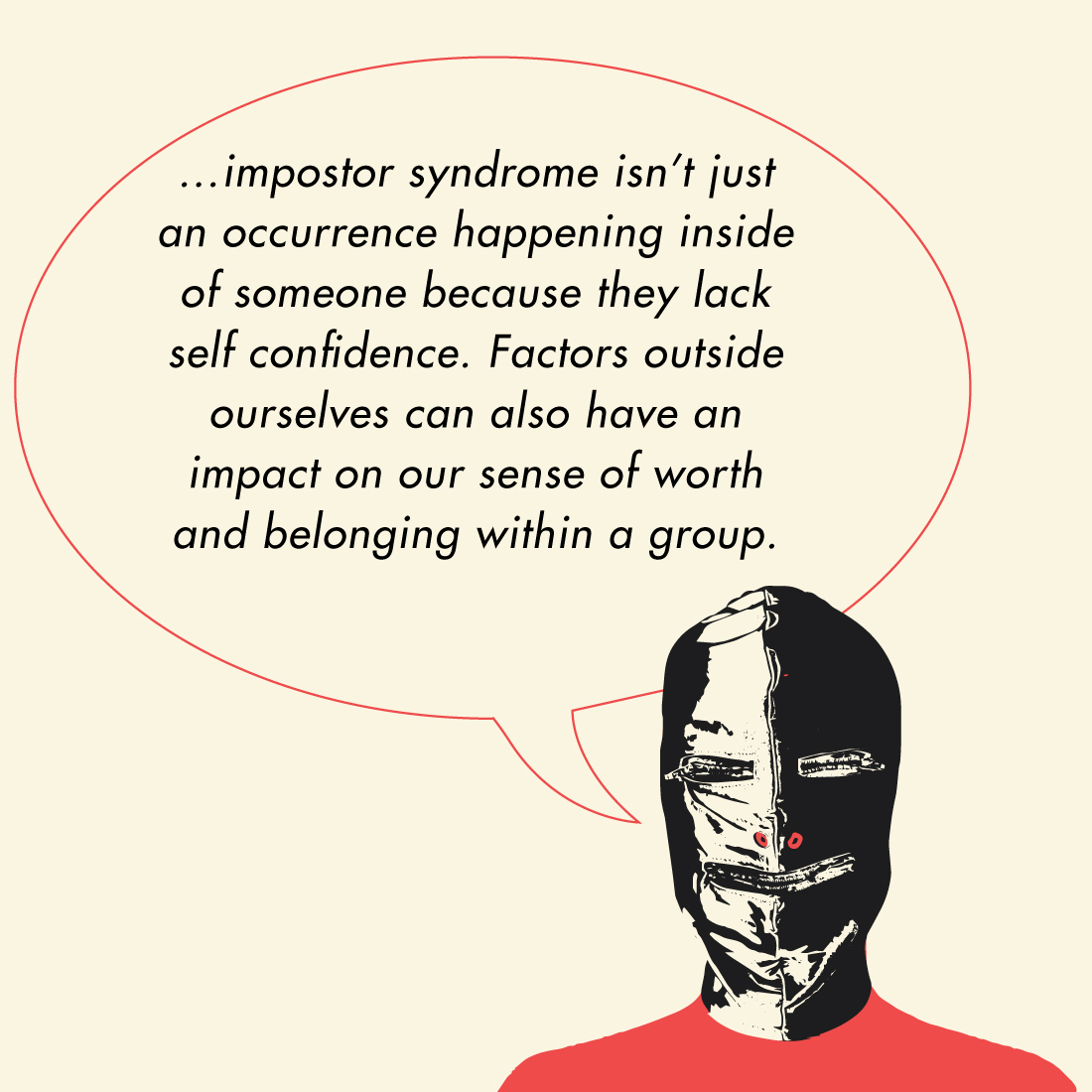
Impostor syndrome is a psychological occurrence where individuals doubt their skills, talents, or accomplishments or have a persistent fear of being exposed as a fraud, often despite having evidence of their competence, accomplishments, and belonging. Those experiencing impostor syndrome often do not believe they deserve their success or luck. This was first recognized as “impostor phenomenon” in 1978 by Pauline R. Clance and Suzanne A. Imes in a research paper that surveyed women in higher education and professional industries about their experiences in these institutions. So, the term originated in a time when women had plenty of reason to feel out of place and uncertain in academic and work environments. They had the double whammy of internalized self-doubt handed down to them from centuries of societal misogyny, with a big dollop of external invalidation coming from the institutions they worked in. This points to the fact that impostor syndrome isn’t just an occurrence happening inside of someone because they lack self confidence. Factors outside ourselves can also have an impact on our sense of worth and belonging within a group.
Is it me or is it them?
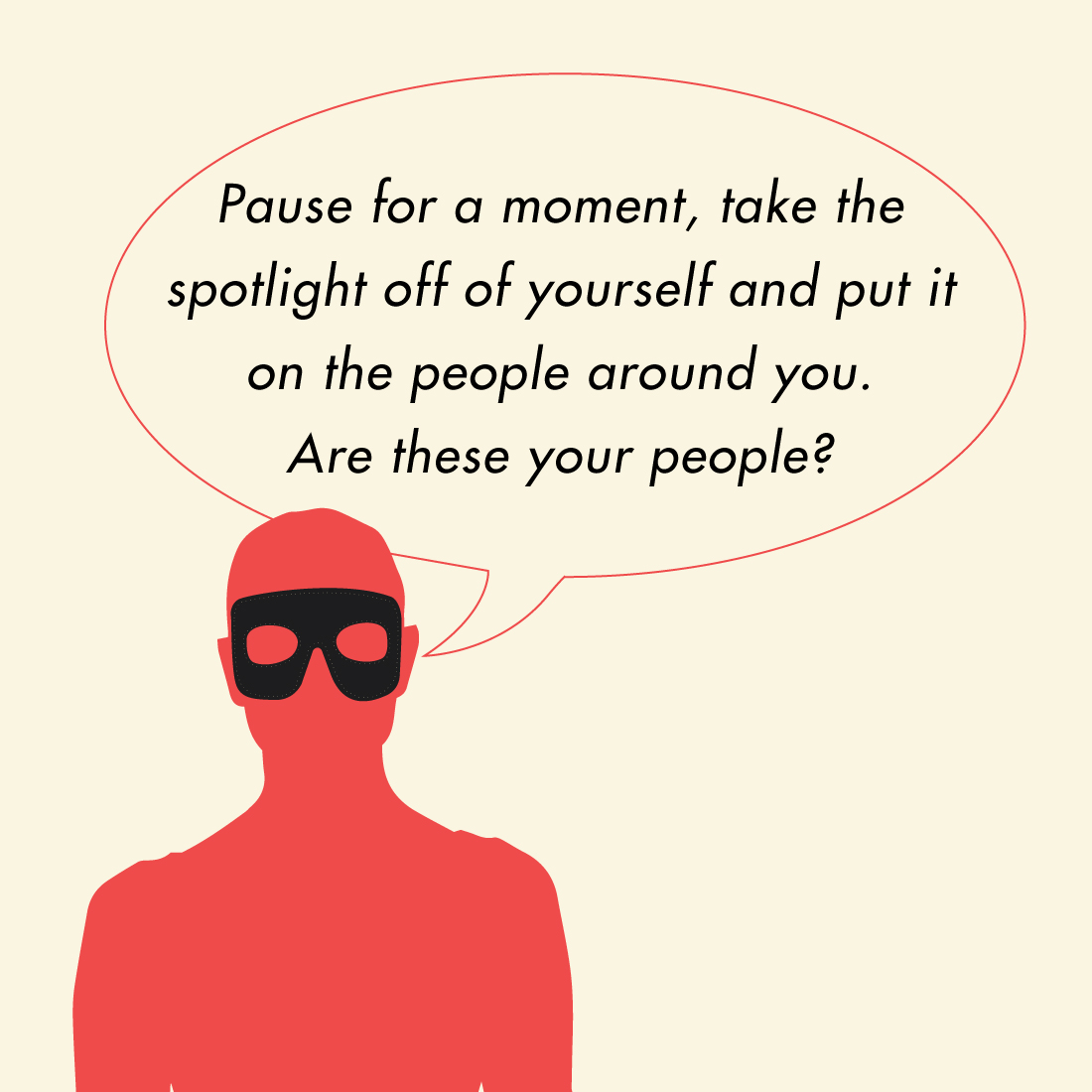
Often we focus only on the internal process of feeling accepted but we also can look outward and ask, “Is this group or establishment right for me?” “Is this a place that aligns with my values?” “Do I want to be accepted by this group?” “Is this a place that I feel welcomed and valued?” To bring this into a kink context, let’s say you go to a play party and you’re feeling awkward and uncomfortable. You’re not sure you belong there. You’re worried you will be judged on your flogging skills or that you’re not as hardcore as the other subs. Pause for a moment, take the spotlight off of yourself and put it on the people around you. Are these your people? Do they see you? Do they value what you’re bringing to the party? Observe, without judgment towards the group or yourself, and assess if you’re at a party that is compatible with you.
Just as important, is to consider your impact on the group. Kink parties often have specific and explicit themes and rules that, if not adhered to, can get a whole room side-eyeing you pretty quick. Make sure you know the party’s etiquette before even picking out your outfit. Is the party focused on a certain type of play or identity? Is there protocol around how you address Dominants or submissives? Will there be sexual play? Are bodily fluids allowed? Will there be alcohol? Play parties take the rules seriously, so do your impostor syndrome a favor and research the rules before you try to pierce someone at a foot party. If you’re worried about your kink skills being under scrutiny, make sure to practice leading up to the party so you can feel confident in your aim or rope ties, etc. Set yourself up for success!
An Inside Job
We all know the real beast to battle is inside of us though. So, how do we fight impostor syndrome on the inside? Well, like with any feeling or emotion, fighting it, ignoring it, or shaming it doesn’t alleviate the problem. In fact, it often exacerbates the issue. So, let’s try something different for a change. Here are some strategies to help you with feelings of awkwardness and a sense of not belonging that you can apply to kinky scenarios as well as your everyday vanilla situations.
Somatic Approach
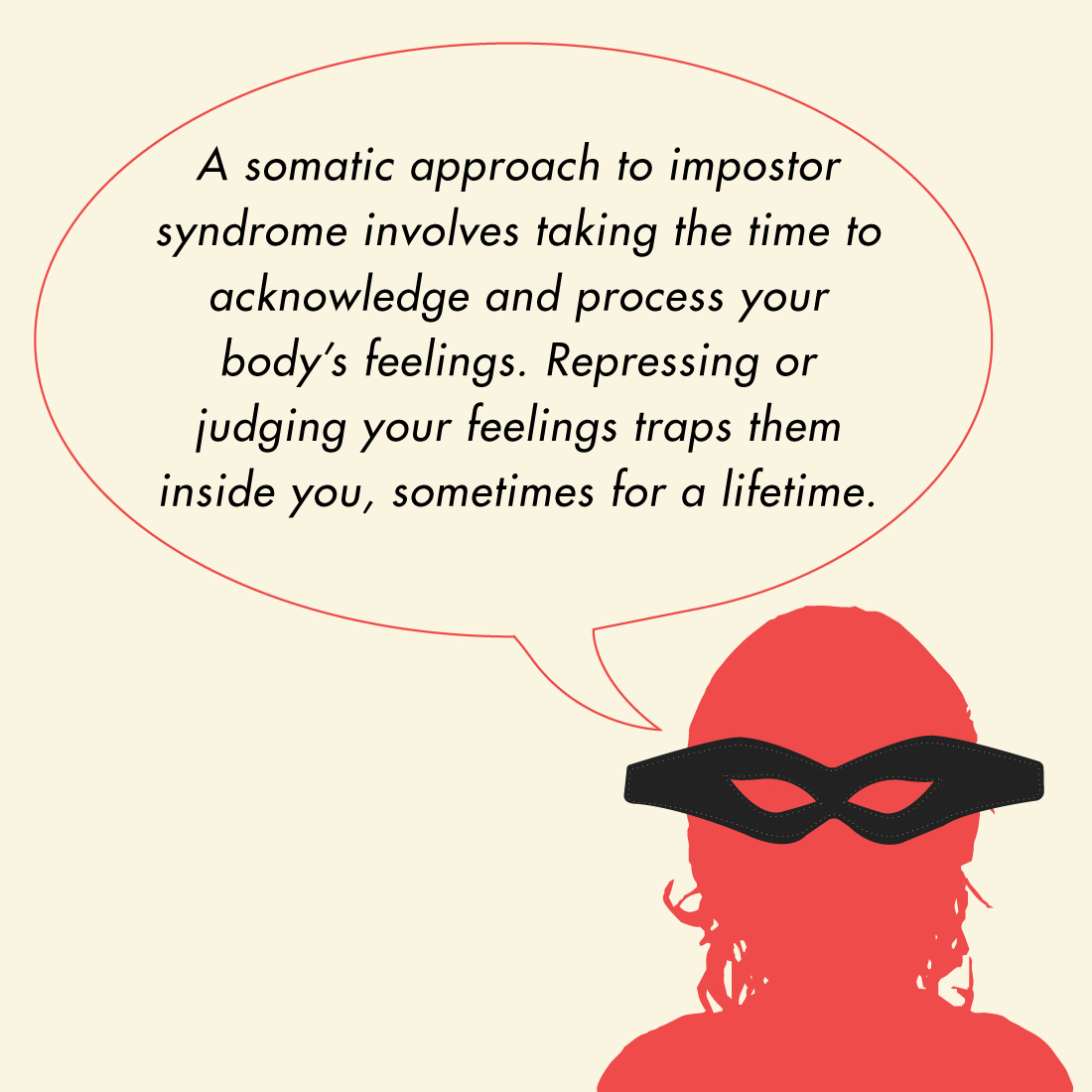
Somatic means “related to the body.” Many of us intellectualize our impostor feelings. We might tell ourselves to buck up, calm down, stop worrying, or we might problem solve by changing our style or appearance in an effort to fit in. These solutions rarely solve the problem and lead us away from authenticity. Buying a bunch of new leather to fit in at the play party may leave you feeling like MORE of an impostor if it is an inauthentic attempt to please others. A somatic approach to impostor syndrome involves taking the time to acknowledge and process your body’s feelings. Repressing or judging your feelings traps them inside you, sometimes for a lifetime. Learning to process your feelings through your body will help relieve you of the overwhelming intensity of feelings like impostor syndrome, shame, grief, anxiety, etc.
So, let’s say you’re at a play party. You’ve been excited to go all week and you’re excited to meet people in the Kink Community. You put a lot of thought into your look and you’re really hoping to get to play with someone tonight. But now that you’re at the party, you find yourself looking around, comparing your outfit, or your body, or skills to these other kinky people. You don’t know anyone and no one has approached you to talk. That other person is way cooler and way better at flogging than you. Everyone has more experience than you and they all know each other. You start judging yourself and questioning why you even thought this was a good idea. You should have stayed home. (Sparks fly out of your head.)
Notice
Hopefully, at this point, you recognize that you’re spinning out. First thing we’ll do is notice that you’re getting dysregulated. What does your body feel like at this moment? Maybe your heart is pounding, or you have a lump in your throat. Maybe your stomach is in knots or your eyes are starting to well up. Are you holding your breath? Are your hands clammy? Close your eyes, take some slow, deep breaths, and just notice what your body is going through.
Investigate
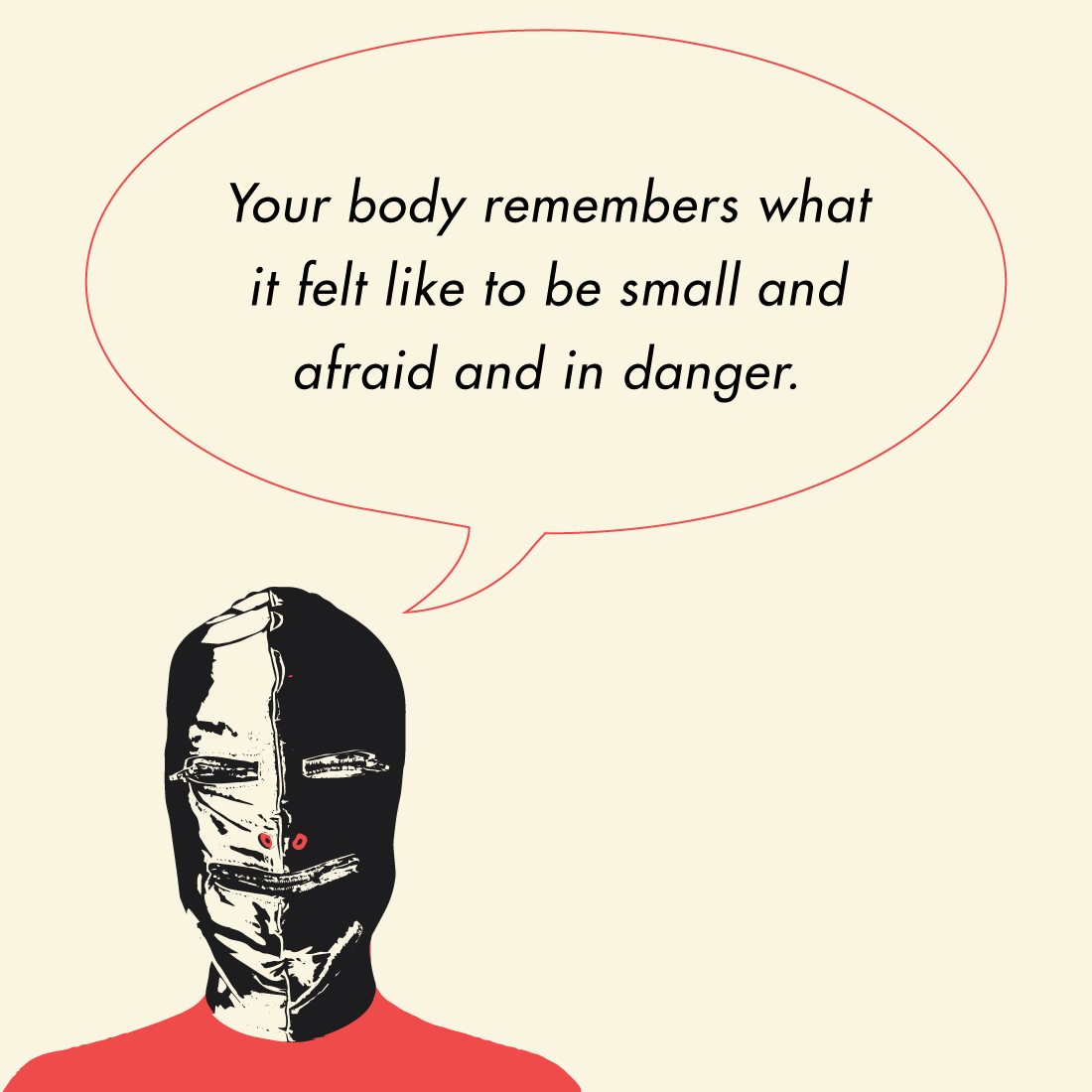
Now, let’s investigate what’s going on with your poor body. What is your body trying to tell you? Is your body afraid? Is it feeling envious? Is this feeling shame? Try to identify your feelings without judging them. They are not positive or negative, or good or bad. They are just feelings that you are naming. Now ask yourself, when was the first time I felt this way? Was it when you were bullied at school? Was it when you were unappreciated or unnoticed as a child? Was it when everyone was included but you? Or when they told you you were stupid or ugly? Your body remembers what it felt like to be small and afraid and in danger. For whatever reason, this situation reminds your body of that early, terrible experience and in the spirit of protecting you, your body now employs resistance to avoid feeling this pain again.
Appreciate
Rather than resisting your body’s efforts to protect you, instead let’s appreciate its dedication to keeping you safe. Thank your body for trying to protect you. Acknowledge its fear and show some compassion for what you’ve gone through together. Recognize that you are no longer that little scared person and reassure your body that you are safe with some deep, long breaths.
Feel
If by this point you still feel agitated, keep processing by feeling into your body. Pick one part that is particularly upset and focus in on it. What shape is it? Is it a walnut in your throat, an empty pit in your stomach, or a swirling ball of energy in your chest? Focus on an edge of that shape. Massage it with your mind. Breathe slow and deep. If the feeling is too overwhelming to focus on then find a part of your body that feels pleasant or neutral. Put your attention there and breathe. Notice the sensation softening, maybe moving and dissipating.
Move
If you’re still feeling dysregulated, move your body. Push against a wall, do some push ups, take a walk around the block, etc. Impact play and physical touch are another way to engage with the body to help it calm and regulate so maybe you’ll get lucky and find a healing Kinkster at the party to help you!
Mind Tricks
Okay, so maybe all the somatic stuff isn’t up your alley or perhaps your impostor syndrome experience is pretty mild and not in need of heavy processing. I have a few tricks that I’ve developed for myself to help me feel confident when I need to be Dominant and command a room at a party, while teaching, or performing.
Get Into Character
When I go out as my Pro-Domme, Boss Bitch, Badass persona, Mistress Mary Typhus, the transformation starts well before I step into the event space. As I get ready, I start thinking like my Dominant self. This persona is still authentically me but with some parts of my personality turned up. As I get dressed I’m turning up the volume on my dominant side and turning down the meeker parts of me. I listen to music that makes me feel powerful and confident. I put on makeup that makes me feel like a Super Villain. I playfully make disapproving or sneering faces at myself in the mirror, exploring and having fun with this side of myself. By the time I make my entrance, the mischievous, Power Top part of me is so juiced up that there’s not much room for my insecurities.
Open Up to Growth & Feedback
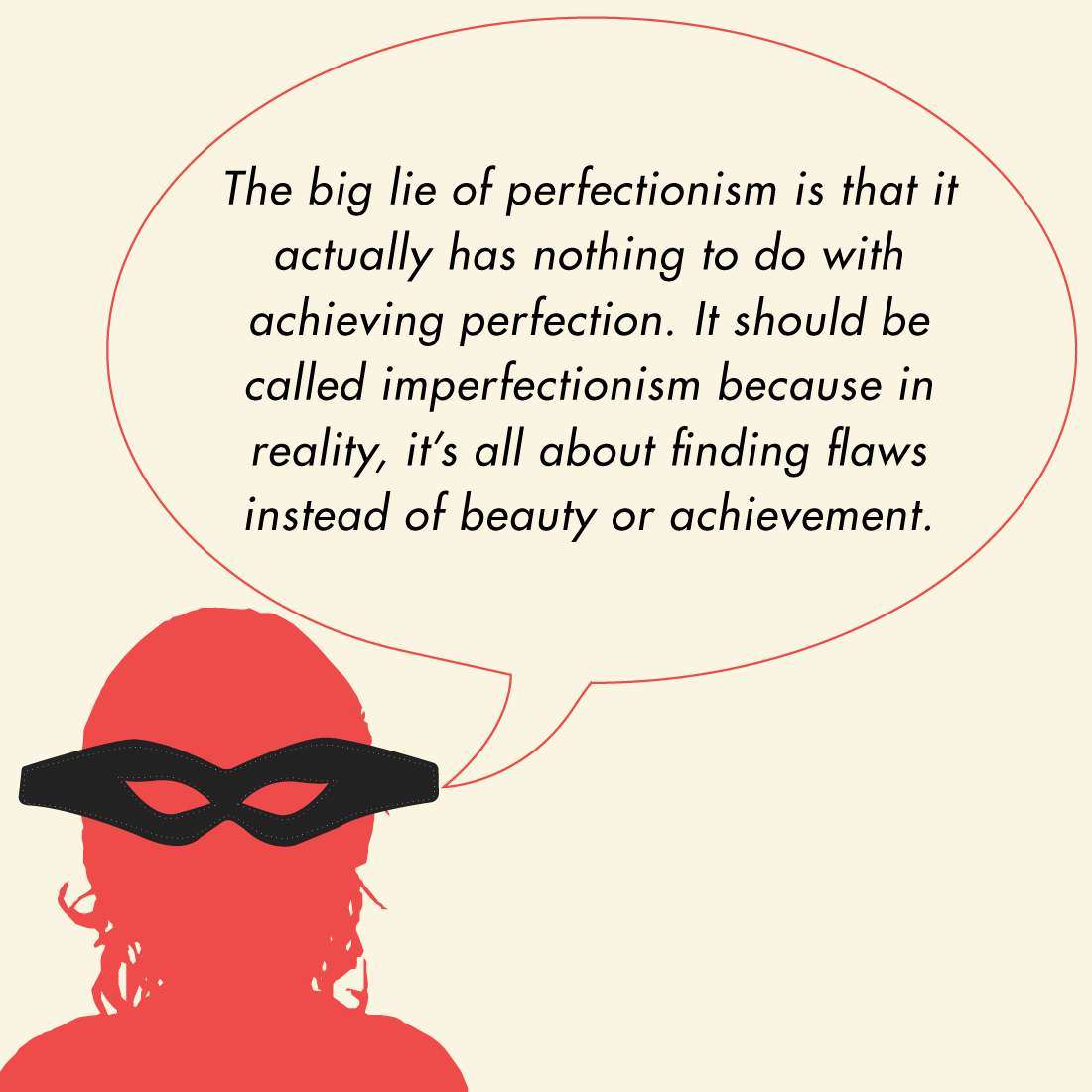
Many of us, including myself, have a delusional belief that if we make a mistake or don’t know everything, all our value goes flying out the window. We expect ourselves to be perfect and if we cannot achieve that then we can feel really bad about ourselves. Perfectionism is like lighter fluid squirting all over your impostor syndrome fire. The big lie of perfectionism is that it actually has nothing to do with achieving perfection. It should be called imperfectionism because in reality, it’s all about finding flaws instead of beauty or achievement. This kind of thinking keeps us in impostor syndrome, constantly afraid someone will figure out that we have flaws or a limitation to our expertise, or that we’re human beings. Luckily, there’s a great antidote to perfectionism; curiosity and growth. Open yourself up to revealing your limitations, asking questions, observing, and taking in feedback. So, when you go to a play party and your aim is a little off or someone used a kink term you don’t know or you feel like everyone’s kinkier than you, just remember that’s okay. Find the pleasure in curiosity, learning something new, or refining your skills. Showing your humanity is endearing and relatable, whereas pretending you know everything and never make mistakes, comes off as inauthentic (like an impostor). Plus, many kinky people love to skillshare and welcome newbies into the fold.
Make Peace with Rejection
And, one last thing I’d like to impart to help with your impostor syndrome and general sense of well-being; remember rejection isn’t about you, it’s about them. If someone doesn’t want to play with you, or accept a compliment, or whatever else you’re offering, that’s okay. It’s not that they don’t want to play with YOU. It’s that THEY don’t want to play with you. That is their thing that has nothing to do with your worthiness or belonging.
Love not War
Kink can go beyond fun, sexy playtime. It can be more than showing off skills and peacocking in front of the community. Kink can be about personal growth, practicing radical consent, connecting with others, and learning to be present and embodied. Directing your Kink practice towards inner wellness, rather than exterior validation, will help minimize conditions like impostor syndrome while boosting your love for yourself and for others. Happy Mental Health Month Kinky People!!
Robin Jennings (aka Mistress Mary) is a seasoned Pleasure Educator and co-host of the Fuck Yeah podcast. She’s a feminist, artist, and former Pro-Domme with a penchant for sexual liberation and free form gender expression. You can find her on IG and Tiktok @fuckyeahpod.
More by Robin:



